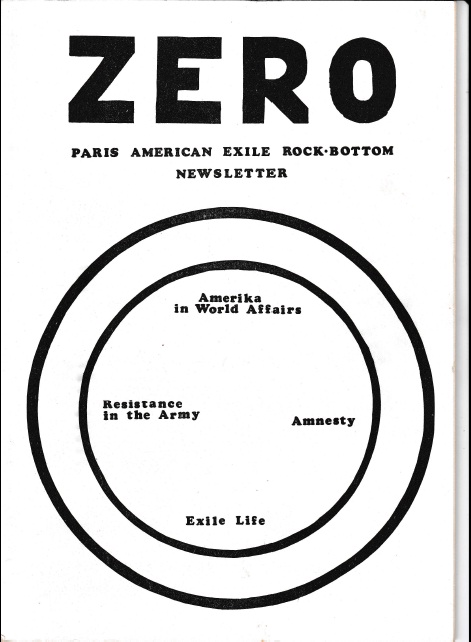
Zero Volume 1, Number 1, July 4, 1973
Front Cover
The first issue did not happen overnight. As draft resisters and deserters drifted in and out of Paris, the resistance community went through several phases. The Zero Collective was the final phase leading up to amnesty and amnesia.
Earlier efforts, dating from 1968, to form a resistance organization including draft resisters and deserters were on the wane. PACS was an association of French and American civilians concerned about the war in South-East Asia.
PACS was made up of well-known French personalities and American long-time residents of Paris as well as students and civilian activists opposed to the war in Vietnam. As an official organization registered with the French government, its activities were closely monitored and restricted. “Defamation of a foreign head of state” was forbidden, for example, and all public statements or demonstrations were subject to prior approval from the police.
Draft resisters and deserters started drifting into France after President Charles de Gaulle withdrew from the NATO command structure in 1966. In 1968, to express his displeasure with the deepening invasion of Vietnam by the US, de Gaulle authorized deserters to receive temporary residence permits on French soil. This directive was not publicized, but word got around, thanks to organizations like PACS.
With the events of 1968 and worsening conditions for resisters in France, most people moved on to other more hospitable countries, like Sweden or Canada. Most resisters just returned to either the military or to the US, either returning to the military or to the judiciary for prosecution, or living underground in the US like the vast majority of draft resisters and deserters.
The Zero Collective was formed in the spring of 1973 after a fortuitous meeting of some old-timers and new-comers at the International Quaker Center on the rue de Vaugirard. Zero magazine was a product of that meeting.
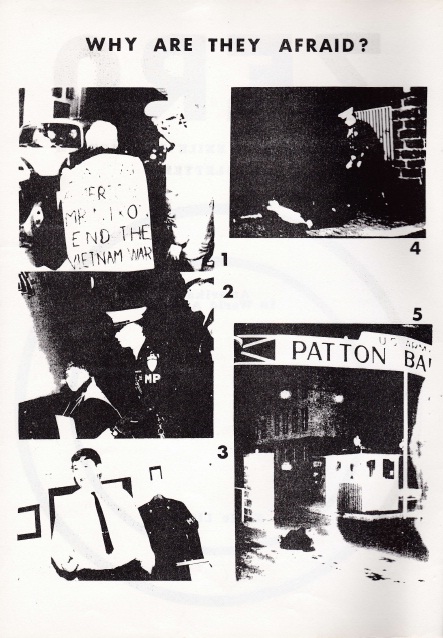
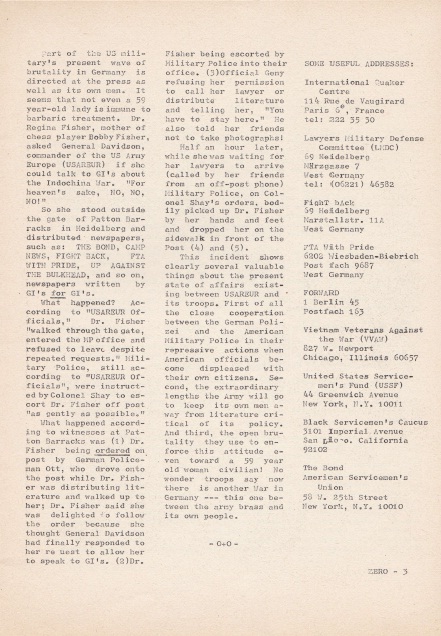
Pages 2 – 3: Why Are They Afraid?
The magazine was reproduced on typed stencils with black and white photos engraved onto the stencils at a local copy shop. The typing and page justification was obviously the work of a skilled, self-retired, Army typist.
This first article showed pictures of US MPs beating and dragging off Regina Fisher, mother of chess champion Bobby Fisher. She was demonstrating outside Patton Barracks in Heidelberg. Her request to speak to GIs on the base about the war was rejected and local police and Military Police were called in to have her assaulted and hauled off.
This article showed the link between the exile community and resistance inside the army through other magazines written “by GIs for GIs” like The Bond, Camp News, Fight Back, FTA With Pride and Up Against the Bulkhead.
The third page also gave references for active-duty GIs and AWOLs on useful contacts in Germany and France.
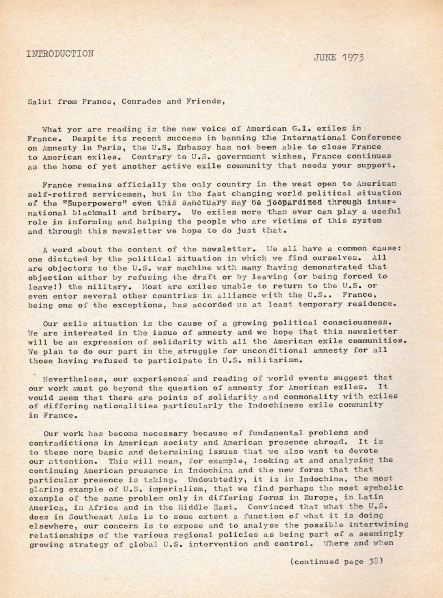
Page 4: Introduction
This is the first time exiles in France made a direct link between their own experiences in trying to express their opinions democratically either in the US as civilians or in the military. The link was made to all socialist and third world countries who were under assault by the US in a new world war. This put Zero on the fringe of US politics, but put it firmly on the ground and in the hearts of countless millions around the planet and in France. Opposing military service wasn’t just opposing the war, supporting better conditions; it was understanding why there was a war. Supporting amnesty wasn’t just a tactic; it was going directly to the root of the problem: support for socialism and third world movements by overwhelming lower-class American war resisters put the American middle class directly on the skillet.
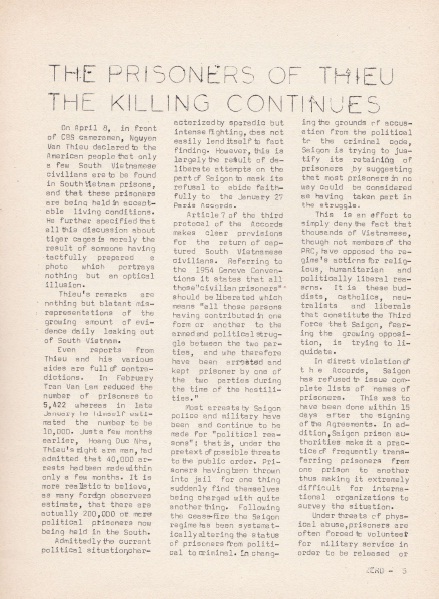
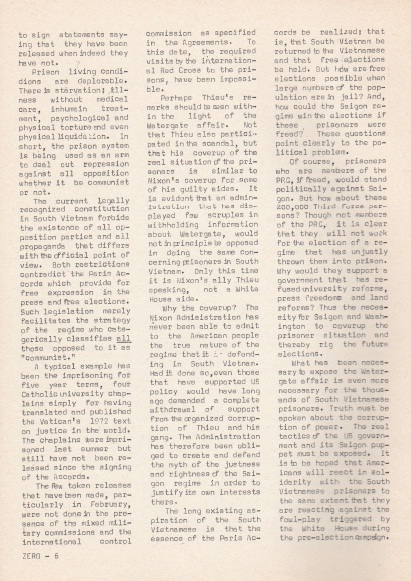
Pages 5 – 6: The Prisoners of Thieu; The Killing Continues
Murder in the prisons of South Vietnam, the notorious tiger cages, became an industry feeding American businesses like IBM and Raymond, Morrison, Knutson-Brown Root (today known as Halliburton who built the prisons in Guantanamo). Dictator Thieu denied US press reports of systematic torture on prisoners. The article also made the link to the Watergate pre-election cover-up and the Nixon administration cover-up of the tiger cages in violation of the treaty signed earlier in 1973.
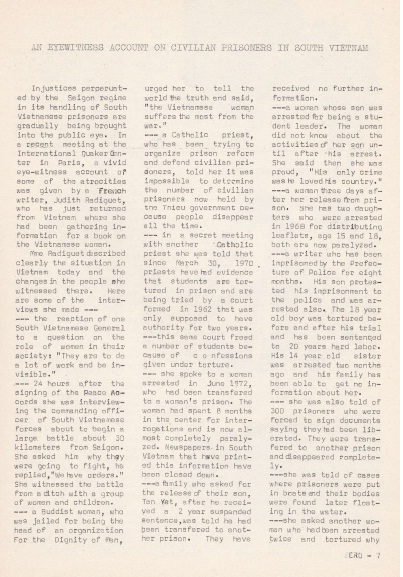
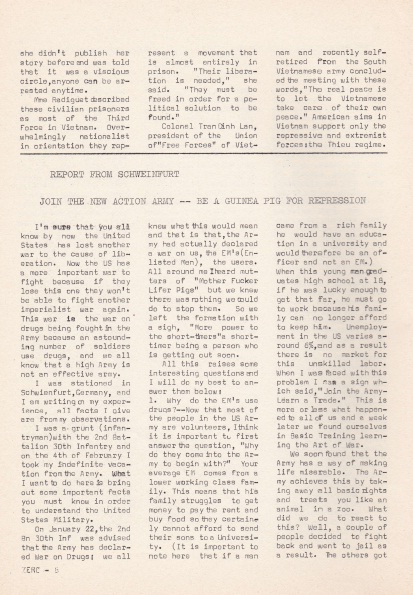
Pages 7 – 8: An Eyewitness Account on Civilian Prisoners in South Vietnam
These eyewitness accounts of torture in South Vietnamese prisons were reported at a conference at the Quaker Center by French writer Judith Radiguet and a self-retired soldier from the South Vietnamese Army, Colonel Tran Dinh Lan. Unknown to us, the Colonel was a famous Gaullist agent in Vietnam who was very influential in the diplomatic offensive. His arguments were impeccable, and her reports were devastating to any idea of American government “goodwill” towards the people of Vietnam.
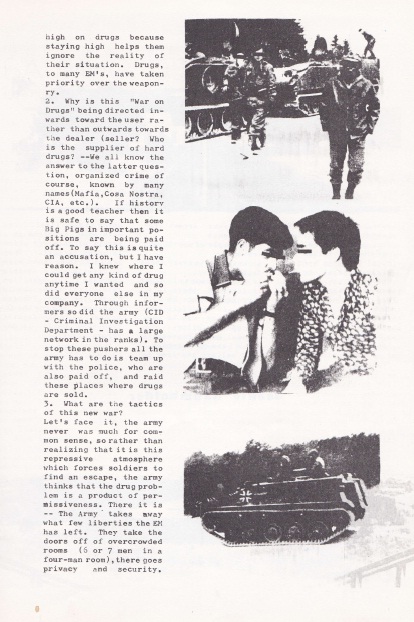
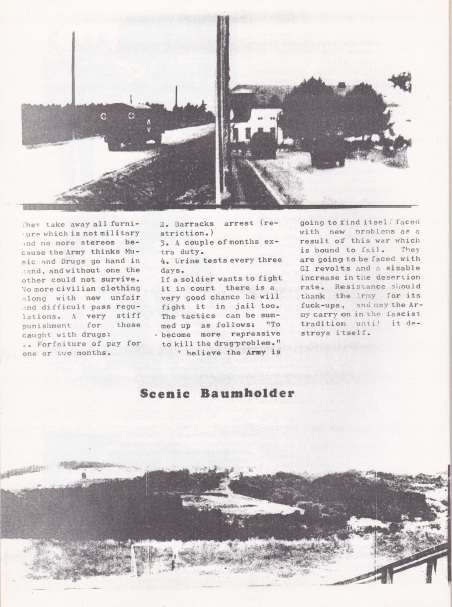
Pages 8 – 10: Report From Schweinfurt
Soc (see Socrates in the biographies section) reported on the War on Drugs being waged in the 30th Infantry Division since the beginning of the year. Thousands of Vietnam veterans returning from the front, addicted to hard and soft drugs were parked in Germany during the 1970’s to “dry out” before the end of their terms of service and return to the US. The Army was at a loss to deal with this situation created to lower the impact of the shock of seeing these soldiers return to a life of scorn, unemployment and suicide. The anti-drug program was a scam to show that the Army had the situation under control before the 1974 elections.
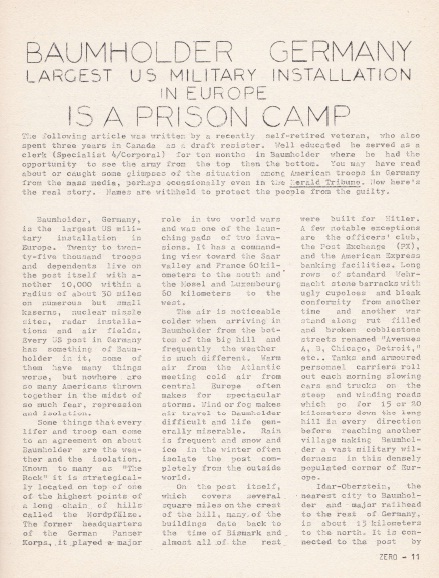
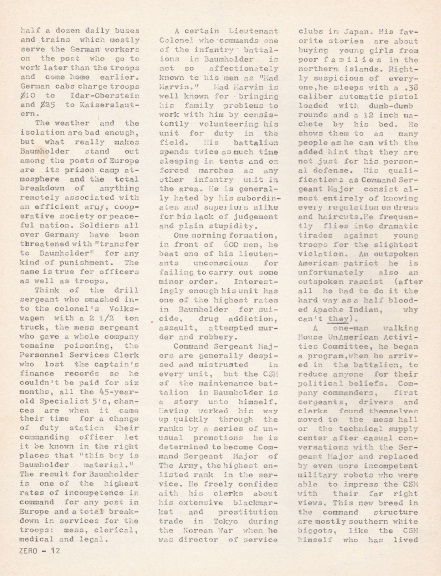
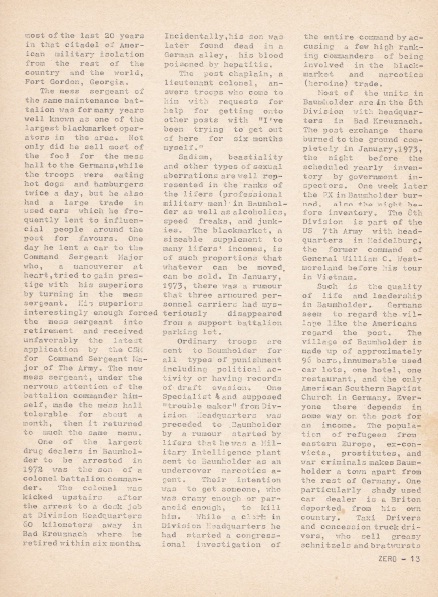
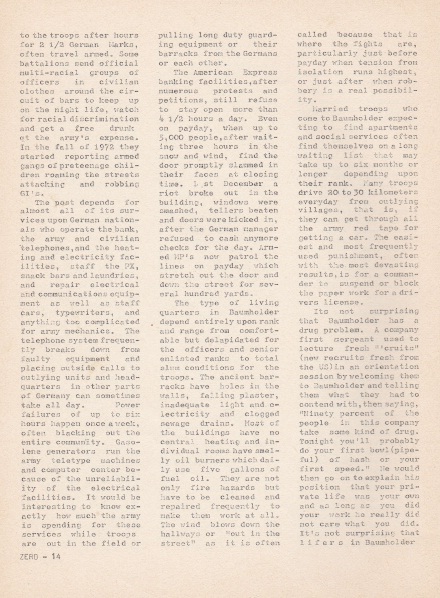
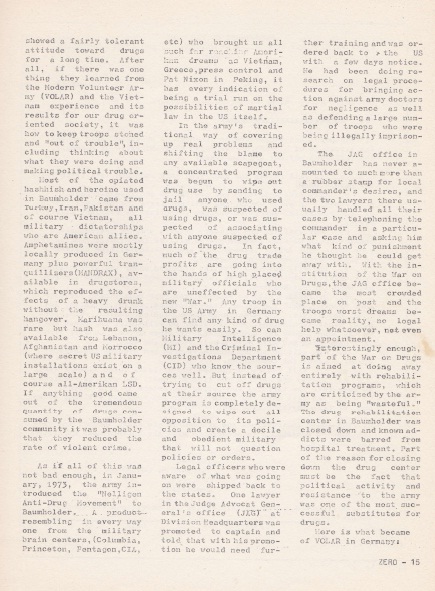
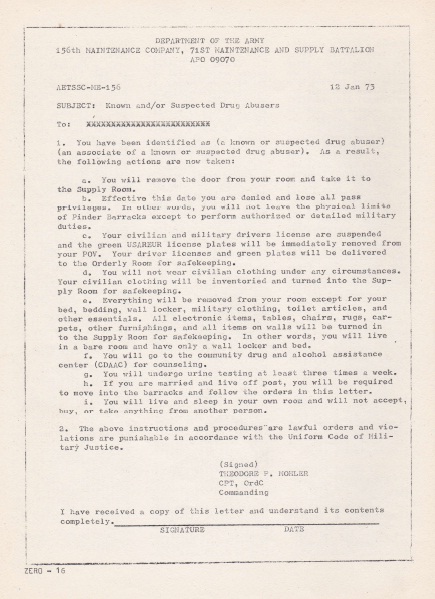
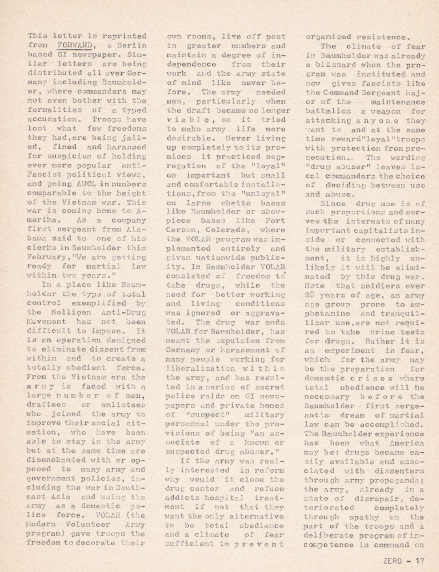
Pages 11 – 18: Baumholder Germany Largest US Military Installation in Europe is a Prison Camp
Tom (see the bio) reported on his stay at the 708th Mobile Maintenance Battalion HQ. Similar if not worse than Schweinfurt, Baumholder offered daily power outages (which shut down the computerized support functions of the 708th), corruption at all levels, drugs everywhere and no operating vehicles (not bad for a mobile maintenance battalion – all the motors had been sold on the black market). This article prompted a congressional investigation instigated by Senator Charles Percy of Illinois. The army admitted many of the charges. No action was taken.
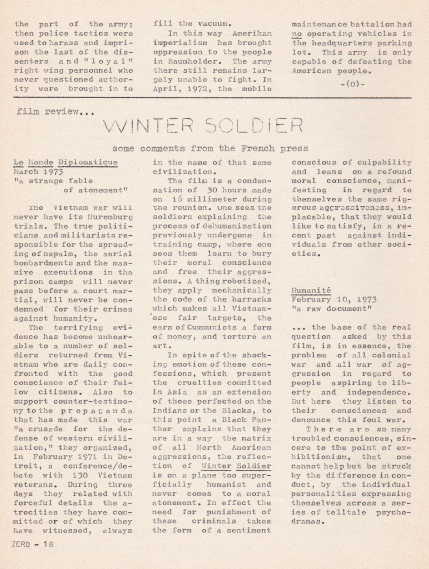
Page 18: Winter Soldier
Film reviews by Le Monde Diplomatique and Humanité of Winter Soldier, a condensation of 30 hours of testimony by Vietnam veterans of their participation in napalming civilians, massive executions in prison camps and systematic torture of prisoners.
Later, Nixon assigned Watergate plumber Charles Colson the task of debunking the testimony of returning veterans on war atrocities. The Pentagon began its own investigation of those heroic veterans to discredit them. Years later the film was still in the news, John Kerry was one of the Navy veterans testifying.
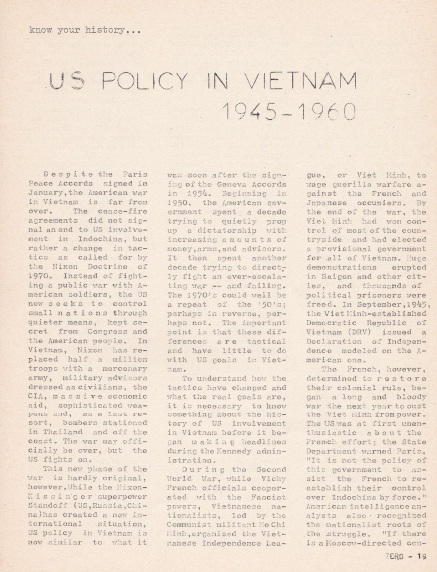
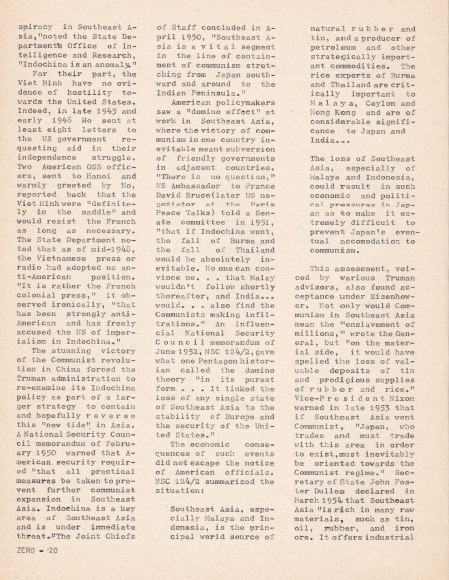
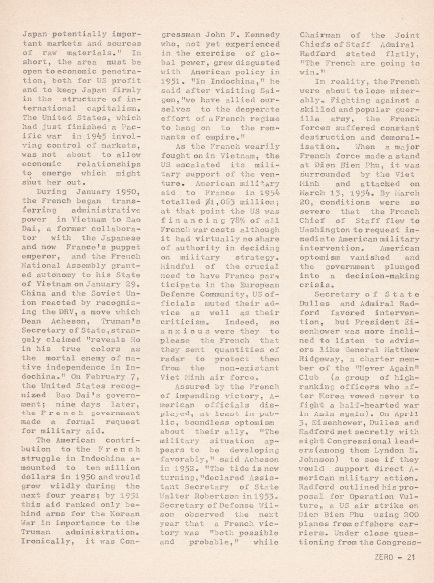
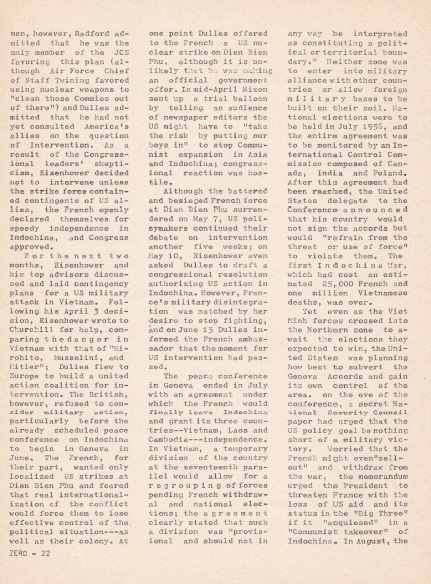
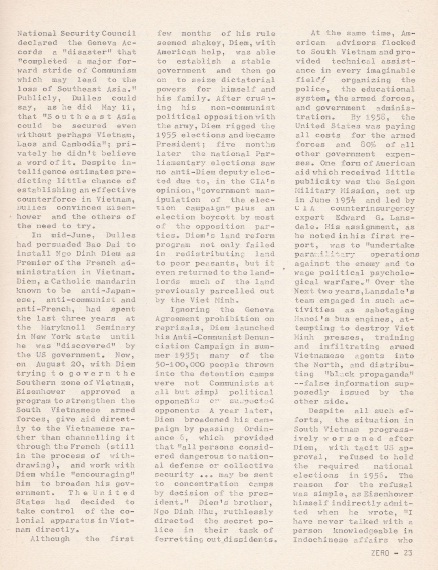
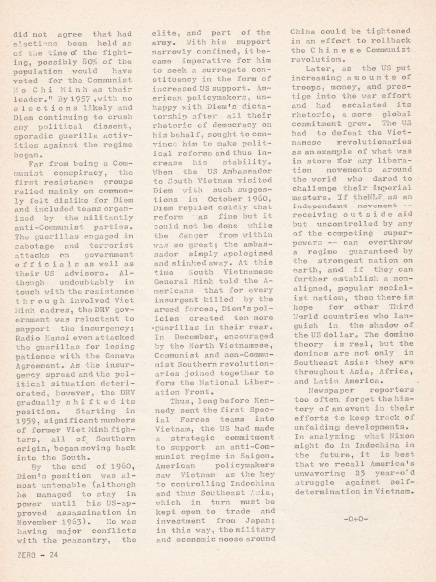
Pages 19 – 24: US Policy in Vietnam 1945-1960
Every US President and Congress since Truman has supported the domino theory of Southeast Asia: if any country falls to the communists, all the others will. This fed an unending plunge into militarization of the conflict in Vietnam. The US violated all the ceasefires and treaties (which led to the French finally withdrawing entirely from Indochina, only to be replaced by the US). Manipulation of public opinion to meet military objectives is not new. Negotiating with the US is risky business indeed.
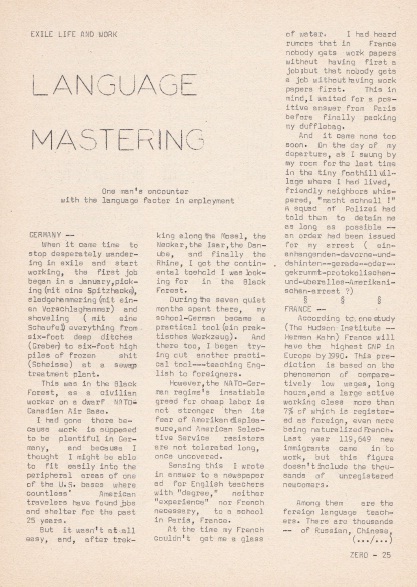
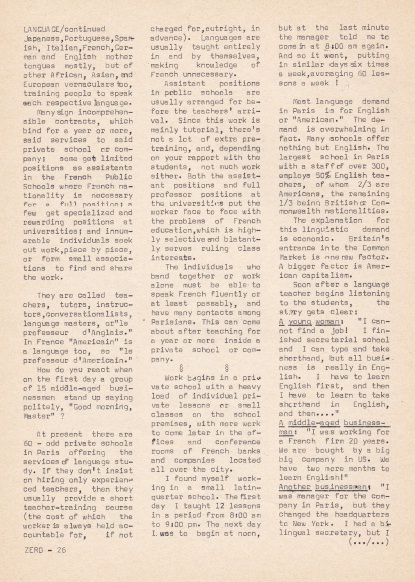
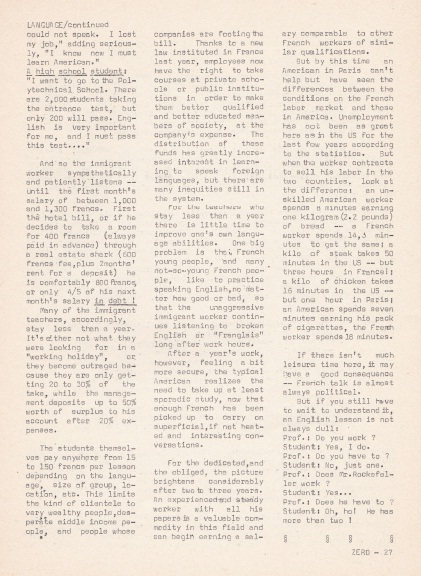
Pages 25 – 27: Language Mastering, One man’s encounter with the language factor in employment
Jim (see bios) writes about the job situation in Germany and France for war resisters. Inevitably resisters find employment in one of the language schools where hiring requirements are low as well as salaries. The complicated government requirements on work permits makes for a Catch-22 situation: you need a work permit to get a job, you need a job to get a work permit. Many of the Zero Collective went on to get jobs as English teachers, following Jim’s example. Jim went on to become a teacher’s union representative.
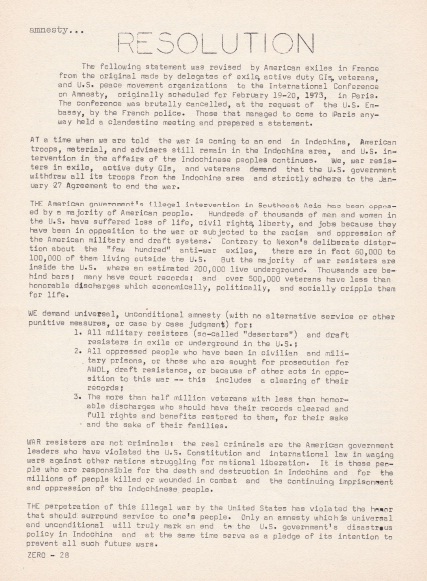
Page 28: Resolution
The international exile community of deserters and draft resisters tried to organize a conference in Paris in February. The conference was banned by the French government. Representatives met clandestinely anyway and published this resolution. It was a declaration for universal and unconditional amnesty for all military resisters, draft resisters and civilians as well as clearing the records of veterans with less than honorable discharges. The resolution states that war resisters are not criminals, the real criminals are US government leaders who have violated the US constitution and international law in waging this disastrous war.
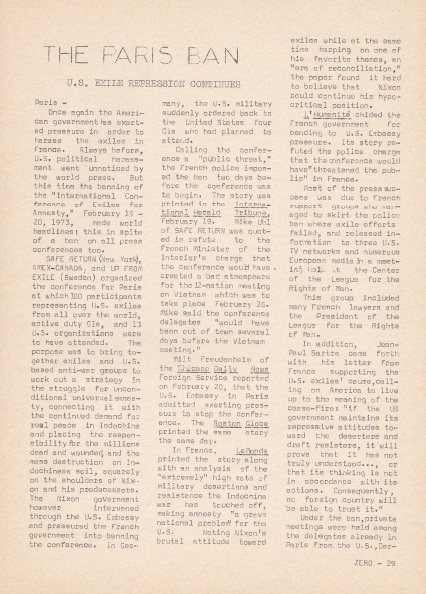
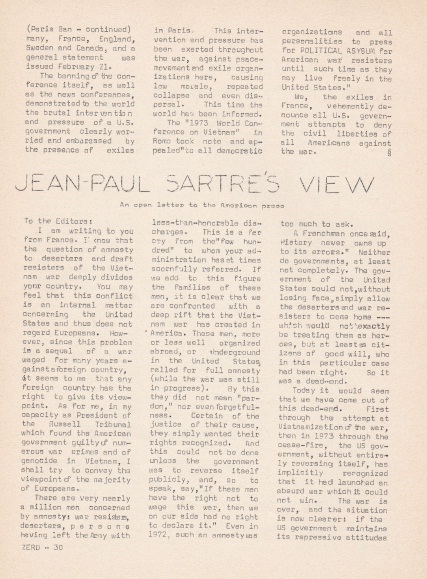
Pages 29 – 30: The Paris Ban, US Exile Repression Continues
This article describes in detail how the US embassy went about pressuring the French government to ban the February conference on amnesty. The establishment press reported widely on the ban and the backlash on the US government was a severe blow to American prestige.
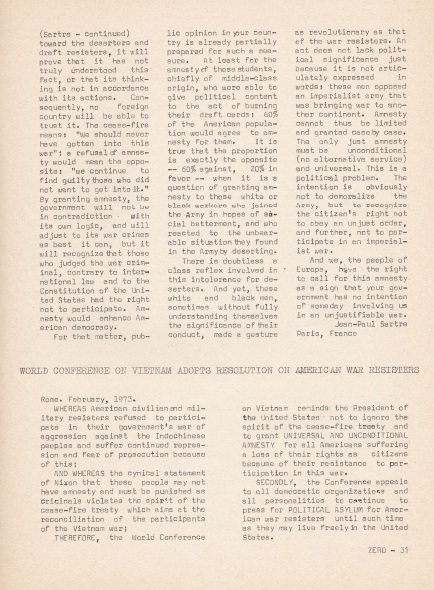
Pages 30 – 31: Jean-Paul Sartre’s View, an Open Letter to the American Press
Jean-Paul Sartre was to have addressed the February conference on amnesty. When it was banned, he wrote this open letter to the American press explaining why amnesty was of interest to Europeans. He makes the direct link between a universal amnesty for all: war resisters as well as poor and black soldiers who enlisted to improve their social status, only to be confronted with an imperialist race war against their third-world brothers; and an unconditional amnesty (not case by case) where racism and class would determine the outcome. As a European, Sartre demanded that Americans guarantee they would never again involve the world in an unjust war.
Page 31: World Conference on Vietnam Adopts Resolution on American War Resisters
Another conference on Vietnam was organized in February in Rome which passed this resolution supporting universal and unconditional amnesty. It also encouraged all democratic organizations and personalities to press for political asylum for American war resisters.
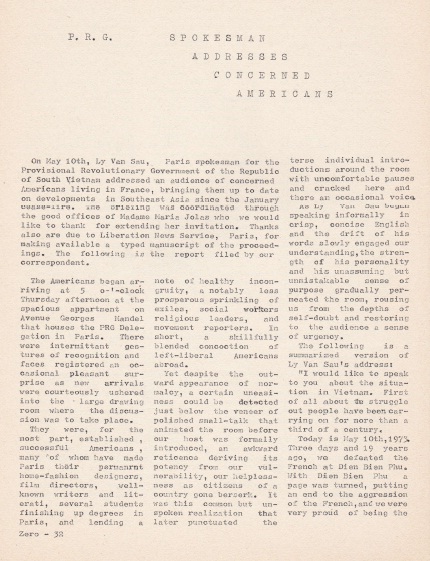
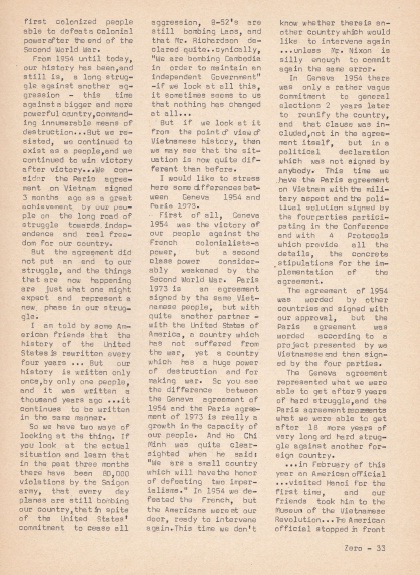
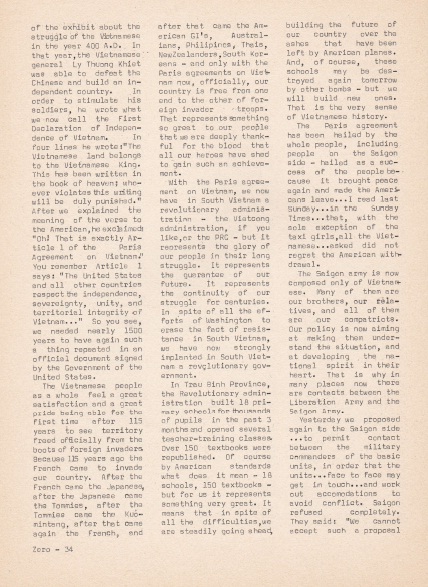
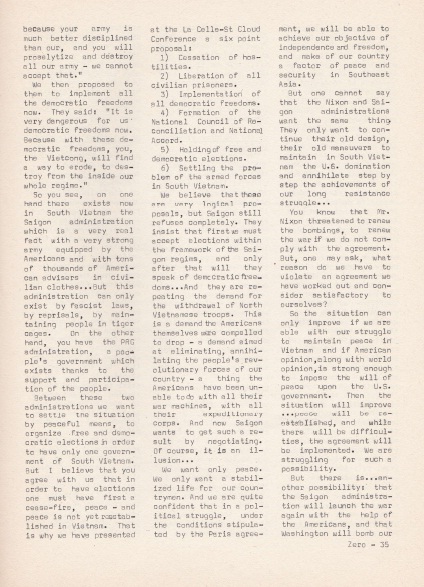
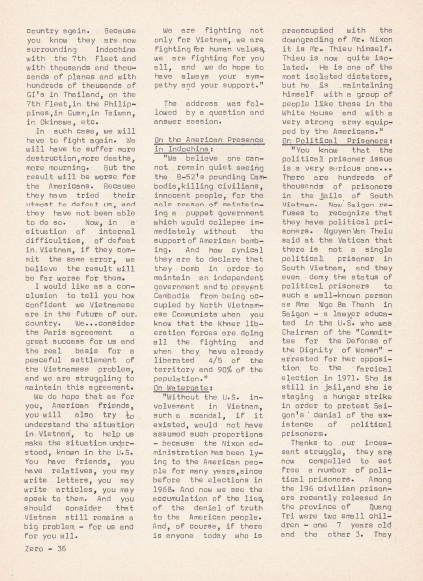
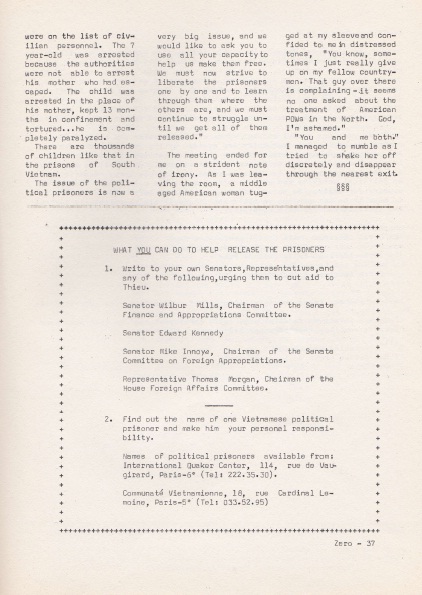
Pages 32 – 37: PRG Spokesman Addresses Concerned Americans
Maria Jolas, a legendary figure of Americans in France since 1919, served as unofficial ambassador to Vietnam and was probably more instrumental in arranging the Paris peace talks than any American diplomat. She was also a founding member of PACS. She arranged for draft resisters and deserters to be present at this meeting on May 10 where Ly Van Sau, the spokesman for the Vietnamese Provisional Government, addressed concerned Americans.
The recently signed Paris Peace Accords continued to be violated by the regime in Saigon with the support of American bombers all over Indochina. PRG members continued to be assassinated and imprisoned by the South Vietnamese regime with the aid of thousands of American “civilian” advisors. There was indeed a short cessation of major military hostilities, but the threat of renewed massive bombardment and invasion was imminent.
The meeting between Vietnamese and Americans was significant. The Nixon administration was falling apart thanks to the efforts of the Vietnamese people. All types of Americans were starting to realize their debt.
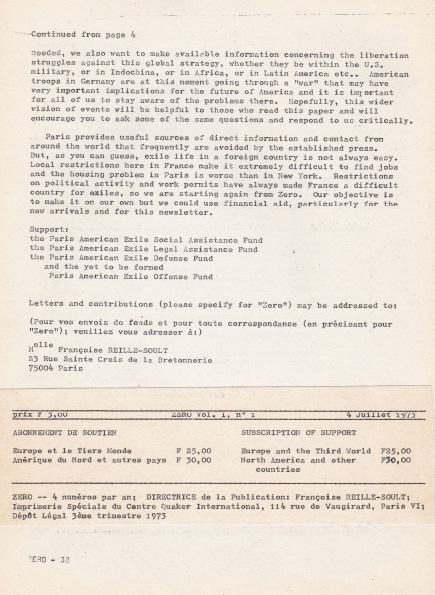
Page 38
Continued from page 4, the Introduction gave references and an appeal for support. The magazine’s official address was 23, rue Saint Croix de la Bretonnerie, the home of Miss Françoise Reille-Soult. Françoise was one of the youngest French people to be sent to the Nazi extermination camps during World War II. She was an active member of PACS.
As an afterthought and before the magazine was mailed, we realized that we had put no subscription information in the issue. A strip of paper two inches high was pasted onto the 38th page with subscription information and the formula required by the French police for all publications.
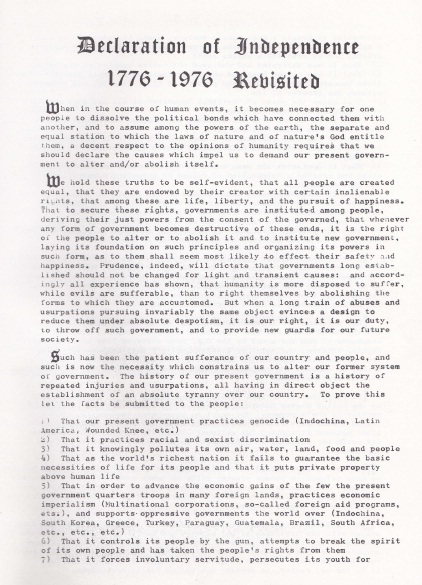
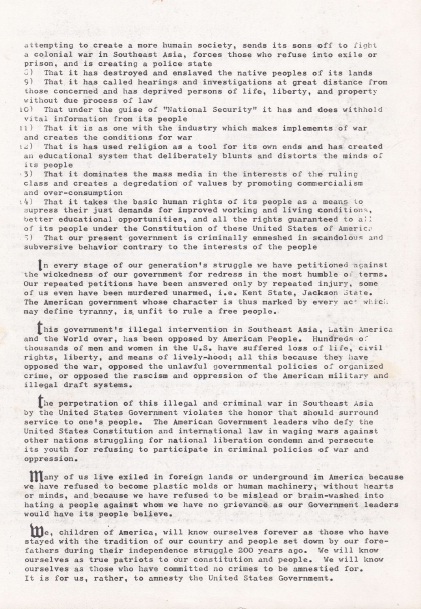
Pages 39 – 40: Declaration of Independence 1776 – 1976 Revisited
After much discussion, the Zero Collective came up with this retake of an ancient document suitable for publication on July 4th, almost two hundred years later.